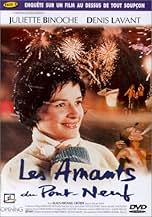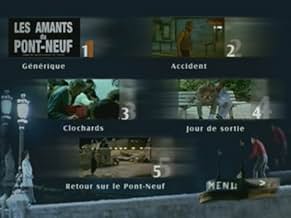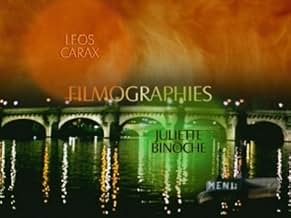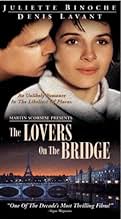Les amants du Pont-Neuf
- 1991
- Tous publics
- 2h 5m
IMDb RATING
7.6/10
16K
YOUR RATING
Alex, who's homeless and addicted to alcohol, and Michèle, who's losing her sight, form a relationship while sleeping rough on Paris's Pont-Neuf bridge.Alex, who's homeless and addicted to alcohol, and Michèle, who's losing her sight, form a relationship while sleeping rough on Paris's Pont-Neuf bridge.Alex, who's homeless and addicted to alcohol, and Michèle, who's losing her sight, form a relationship while sleeping rough on Paris's Pont-Neuf bridge.
- Nominated for 1 BAFTA Award
- 4 wins & 8 nominations total
Chrichan Larsson
- Julien
- (as Chrichan Larson)
- Director
- Writer
- All cast & crew
- Production, box office & more at IMDbPro
Featured reviews
Obsession, addiction, violence and love. Sometimes all four at the same time. If nothing else, this movie is a complete roller-coaster ride through the emotions. It's hard to say whether it's really a love story. Is it love when you want to possess someone to the point where you would rather they go blind than go away? Is it love to want to drag someone down with you to bottom of your own degradation? Is it love when you would take someone's life because they wanted to go home? But then again, is it love when you allow all this to happen and still come back for more? I have my doubts.
This is really a story of obsession and possession between two people who find themselves marooned out on the edge of human existence. They find something like tenderness, something like love by holding on to each other like two children lost in the dark woods. But obsession is ultimately destructive and so it is here. Alex wants Michelle but never really shows any real tenderness. He has nothing to offer except cheap wine and an old overcoat. He is destructive, violent and child-like. The relationship between Alex and Michelle is quite impossible to comprehend sometimes. What this movie does have is passion. But this is real life passion. Real and raw. If you ever see real people like Alex and Michelle, and they do exist, you can see how they cling to each other, how they abuse each other, how they are possessed by their lifestyle, unable or unwilling to fight their way out of their humiliation. So in the end they just drag each further down, drowning in hopelessness.
But just as you think the story is going to end in tragedy...well you have to watch it for yourself.
The cinematography in this movie is breathtaking at times, but in a very unconventional way. It is beautiful to watch even though there is precious little that is attractive. Paris looks by turns both shiny and exciting and then dark, grey and filthy. Which, if you've been there, you will know is exactly how it is. There is not a single shot of any famous Parisian landmark either. Only the river Seine and the bridges around Pont Neuf are part of the landscape in this story.
It's really an ensemble piece for two characters; two characters caught up in obsession, possession and some kind of love story. The two lead actors, Juliette Binoche and Dennis Levant produce performances of real emotional power and subtlety. There is nothing coming out of Hollywood to match movies like this, nor are there many actors, if any, who could get close to performances like these. One day the Academy will begin to recognise that acting and movies is not just about box office returns and bestow their awards on movies like this.
This is really a story of obsession and possession between two people who find themselves marooned out on the edge of human existence. They find something like tenderness, something like love by holding on to each other like two children lost in the dark woods. But obsession is ultimately destructive and so it is here. Alex wants Michelle but never really shows any real tenderness. He has nothing to offer except cheap wine and an old overcoat. He is destructive, violent and child-like. The relationship between Alex and Michelle is quite impossible to comprehend sometimes. What this movie does have is passion. But this is real life passion. Real and raw. If you ever see real people like Alex and Michelle, and they do exist, you can see how they cling to each other, how they abuse each other, how they are possessed by their lifestyle, unable or unwilling to fight their way out of their humiliation. So in the end they just drag each further down, drowning in hopelessness.
But just as you think the story is going to end in tragedy...well you have to watch it for yourself.
The cinematography in this movie is breathtaking at times, but in a very unconventional way. It is beautiful to watch even though there is precious little that is attractive. Paris looks by turns both shiny and exciting and then dark, grey and filthy. Which, if you've been there, you will know is exactly how it is. There is not a single shot of any famous Parisian landmark either. Only the river Seine and the bridges around Pont Neuf are part of the landscape in this story.
It's really an ensemble piece for two characters; two characters caught up in obsession, possession and some kind of love story. The two lead actors, Juliette Binoche and Dennis Levant produce performances of real emotional power and subtlety. There is nothing coming out of Hollywood to match movies like this, nor are there many actors, if any, who could get close to performances like these. One day the Academy will begin to recognise that acting and movies is not just about box office returns and bestow their awards on movies like this.
Oddly enough, "Les Amants du Pont-Neuf" reminded me of Francis Ford Coppola's own romantic extravaganza, "One From the Heart." Think about it: both were directed by cinematic wunderkinds; both went way over budget and had troubled productions; and both were, at their hearts, rather simple love stories that their directors inflated, rather perversely, into massive technical undertakings.
On that level, at least, "Les Amants..." works. The movie is filled with striking images -- the fireworks display as seen from Pont-Neuf, the flaming posters lining the walls of the Metro, and so on. It is not at all inaccurate to call this one of the most stunningly photographed films of all time.
But whereas the movie succeeds as a grand visual spectacle, it disappoints just about everywhere else. The relationship between Alex (Denis Levant) and Michele (Juliette Binoche, who manages to be as radiant as ever in spite of her role as a fairly grungy homeless painter) occasionally results in some moments of pure emotional power, which are promptly deflated with one of Alex's bizarre, unexplained transformations into a possessive, selfish, nearly sociopathic jerk. (His dreadfully unconvincing hyena-laugh doesn't help much.) Since the romance between these two characters is the crux of the film, this inconsistency mortally wounds the film. Maybe Carax was trying to convey a sense of the "amour fou" French romances are famous for; if so, he failed.
Even worse, though, are the myriad subplots that Carax introduces but doesn't do anything with. The old man (Klaus-Michael Gruber) with whom Alex hangs around with serves no purpose other than to give Michele the key to an art museum, yet he has the film's only significant supporting role. And it becomes clear later in the film that Michele (who is rapidly losing her sight) is, in fact, on the run from her past, but we learn next to nothing of it -- who, exactly, is "Marion"? Why does Michele (apparently) shoot her ex-boyfriend, Julien? These aren't just anal-retentive questions -- these are major plot points that would have helped tremendously in developing Michele. But Carax doesn't care; he was either in too much of a hurry to get the script done (not at all unlikely -- see the "Trivia" section), or didn't regard the story as anything more than a clothesline to hang his visuals on.
There are two other major irritations. First is the way the plot falls back on the "miracle-working ophthalmologist." You know that device: that's the one were the hero/heroine is/is going blind but can have his/her sight saved by visiting some lone eye surgeon who has developed a miraculous cure for their affliction. Not only does this trivialize Michele's torment, but it also robs the film of what could have been an even more poignant ending -- surely I'm not the only one who thinks the portrait-painting scene would've been more touching if Michele had done it blindly.
That brings me to the second sore spot: the ending. Michele ominously tells Alex she has to leave; Alex flies into a rage and pushes her into the Seine, following her in. When they rise to the surface, though, Michele is laughing as though Alex's little tantrum had never happened, as though she doesn't care that he would rather see her drown than risk losing her. (We're never told, by the way, why Michele had to leave.) They then board a garbage barge together, and the film suddenly turns into an homage to Vigo's "L'Atlante" that is so blatant that the only way it could've been more obvious was if Vigo had received co-directing credit. Since nothing else in the film suggests "L'Atlante," this unexpected reference comes across as just more evidence of sloppy writing, that Carax couldn't be bothered to think of a decent ending and just threw together the unsatisfying (but beautifully shot -- go figure) climax we're stuck with.
Don't get me wrong -- this is NOT a bad film. But it IS a tremendous disappointment, even for me, who has never exactly been a fan of Carax's work. Foreign film buffs should still see it -- maybe you'll have better luck focusing on the sights and sounds and blocking out the meandering screenplay.
On that level, at least, "Les Amants..." works. The movie is filled with striking images -- the fireworks display as seen from Pont-Neuf, the flaming posters lining the walls of the Metro, and so on. It is not at all inaccurate to call this one of the most stunningly photographed films of all time.
But whereas the movie succeeds as a grand visual spectacle, it disappoints just about everywhere else. The relationship between Alex (Denis Levant) and Michele (Juliette Binoche, who manages to be as radiant as ever in spite of her role as a fairly grungy homeless painter) occasionally results in some moments of pure emotional power, which are promptly deflated with one of Alex's bizarre, unexplained transformations into a possessive, selfish, nearly sociopathic jerk. (His dreadfully unconvincing hyena-laugh doesn't help much.) Since the romance between these two characters is the crux of the film, this inconsistency mortally wounds the film. Maybe Carax was trying to convey a sense of the "amour fou" French romances are famous for; if so, he failed.
Even worse, though, are the myriad subplots that Carax introduces but doesn't do anything with. The old man (Klaus-Michael Gruber) with whom Alex hangs around with serves no purpose other than to give Michele the key to an art museum, yet he has the film's only significant supporting role. And it becomes clear later in the film that Michele (who is rapidly losing her sight) is, in fact, on the run from her past, but we learn next to nothing of it -- who, exactly, is "Marion"? Why does Michele (apparently) shoot her ex-boyfriend, Julien? These aren't just anal-retentive questions -- these are major plot points that would have helped tremendously in developing Michele. But Carax doesn't care; he was either in too much of a hurry to get the script done (not at all unlikely -- see the "Trivia" section), or didn't regard the story as anything more than a clothesline to hang his visuals on.
There are two other major irritations. First is the way the plot falls back on the "miracle-working ophthalmologist." You know that device: that's the one were the hero/heroine is/is going blind but can have his/her sight saved by visiting some lone eye surgeon who has developed a miraculous cure for their affliction. Not only does this trivialize Michele's torment, but it also robs the film of what could have been an even more poignant ending -- surely I'm not the only one who thinks the portrait-painting scene would've been more touching if Michele had done it blindly.
That brings me to the second sore spot: the ending. Michele ominously tells Alex she has to leave; Alex flies into a rage and pushes her into the Seine, following her in. When they rise to the surface, though, Michele is laughing as though Alex's little tantrum had never happened, as though she doesn't care that he would rather see her drown than risk losing her. (We're never told, by the way, why Michele had to leave.) They then board a garbage barge together, and the film suddenly turns into an homage to Vigo's "L'Atlante" that is so blatant that the only way it could've been more obvious was if Vigo had received co-directing credit. Since nothing else in the film suggests "L'Atlante," this unexpected reference comes across as just more evidence of sloppy writing, that Carax couldn't be bothered to think of a decent ending and just threw together the unsatisfying (but beautifully shot -- go figure) climax we're stuck with.
Don't get me wrong -- this is NOT a bad film. But it IS a tremendous disappointment, even for me, who has never exactly been a fan of Carax's work. Foreign film buffs should still see it -- maybe you'll have better luck focusing on the sights and sounds and blocking out the meandering screenplay.
Oh, please. I used to say I could watch Juliette Binoche read the phone book, but this sorely tested that theory. What a mess of a movie! -- by turns a tired liberal pseudodocumentary on the homeless (though by the end, you realize that according to this flick, homelessness is a byproduct of personal misfortune and not, evidently, any societal forces), a down-and-dirty romance (Binoche can be forgiven; what actress [or actor] wouldn't want to play a one-eyed homeless artist losing the vision in the other eye?), an extended music video, and God knows what else, all set in a Paris largely devoid of traffic and people. Completely lacking *internal* logic (and yes, fables do need that), it seems to have acquired quite a few devotees drawn to its alleged "poetry." All I see is pretentiousness and self-indulgence. If the other reviews here tempt you to see it anyway, that's fine; but don't say you weren't warned.
I've just watched this film and, out of curiosity, the comments of several contributors to this bulletin board. Simply can't fathom the glowing enthusiasm of most of these - though I suppose they are self-selected from those who have actually been able to sit through it.To me it seemed phony, pretentious, and in the end unbelievably boring - both words here seem applicable alone as well as in tandem. I'm rather fond of Binoche, and this may have something to do with my impression that she found the role one that couldn't be played convincingly - that she as a result could only stumble through it sans conviction. Why did I then watch it through? In the hope of some saving grace - which I certainly failed to find in that silly resolution.
This is one of the great romances precisely because it goes against the grain of all the great screen romances. Because of its ability to strike new terrain -- to go where no romance has gone before, to take chances, in essence -- it achieves a level of passionate intensity that most romantic films could only dream of mustering.
The camera work -- by Jean-Yves Escoffier, one of the great cinematographers working today (who shot Leos Carax's early films -- "Bad Blood" and "Boy Meets Girl" -- as well as Larry Clark's "Kids," and the directorial debut of Harmony Korine, "Gummo") -- is absolutely breathtaking. I cannot overemphasize this. It is, perhaps, one of the most beautiful color films ever made. The style of the film suits the subject matter perfectly. It proves that the great films have a form that not only compliments the subject matter, but becomes it. The content is the form, and vise versa. The film is shot "Cinema-Verite" style, with rough, hand-held, choppy camerawork, and a gritty, realistic aesthetic quality. There are moments of fancy and surrealism that would seem to utterly contradict this style. On the contrary, these moments are rendered believable, avoid presenting problems of logic, because of the film's harsh, balancing tone. The "wild" style of the film captures perfectly the passionate, stormy affair of the lovers -- the truest love, and certainly the most passionate, the film says, is that closest to nature, to the base element of humanity.
Another layer of enjoyment comes from the film's similarity to Jean Vigo's "L'Atlante." In fact, the final sequence in the film has the two lovers plummeting from the bridge into the cold water. They are picked up by a sand barge, on its final trip to the ocean. The husband and wife, who we learn have spent their life shipping sand, agree to take them along. It is almost as if the couple in "L'Atlante" have reappeared to prove that passionate, tumultuous love affairs can end happily, despite their problems. One of the last shots of the film shows the two lovers walking across the barge, over the hills of sand, to the bow -- a direct quotation of "L'Atlante."
The last shot (for enemies of James Cameron's "Titanic" -- an absolutely shallow romance; as cold and heartless as the iceberg that dooms the ship) shows the two lovers hovering over the bow of the ship, magically, as if suspended by love. It is obvious James Cameron plagiarized this moment ("Les Amants..." came out in 1991). This fact should be trumpeted far and wide. "Titanic" is a bloated whale of a movie. "Les Amants du Pont Neuf" is simply the greatest romance to have erupted on the screens in the last decade.
The camera work -- by Jean-Yves Escoffier, one of the great cinematographers working today (who shot Leos Carax's early films -- "Bad Blood" and "Boy Meets Girl" -- as well as Larry Clark's "Kids," and the directorial debut of Harmony Korine, "Gummo") -- is absolutely breathtaking. I cannot overemphasize this. It is, perhaps, one of the most beautiful color films ever made. The style of the film suits the subject matter perfectly. It proves that the great films have a form that not only compliments the subject matter, but becomes it. The content is the form, and vise versa. The film is shot "Cinema-Verite" style, with rough, hand-held, choppy camerawork, and a gritty, realistic aesthetic quality. There are moments of fancy and surrealism that would seem to utterly contradict this style. On the contrary, these moments are rendered believable, avoid presenting problems of logic, because of the film's harsh, balancing tone. The "wild" style of the film captures perfectly the passionate, stormy affair of the lovers -- the truest love, and certainly the most passionate, the film says, is that closest to nature, to the base element of humanity.
Another layer of enjoyment comes from the film's similarity to Jean Vigo's "L'Atlante." In fact, the final sequence in the film has the two lovers plummeting from the bridge into the cold water. They are picked up by a sand barge, on its final trip to the ocean. The husband and wife, who we learn have spent their life shipping sand, agree to take them along. It is almost as if the couple in "L'Atlante" have reappeared to prove that passionate, tumultuous love affairs can end happily, despite their problems. One of the last shots of the film shows the two lovers walking across the barge, over the hills of sand, to the bow -- a direct quotation of "L'Atlante."
The last shot (for enemies of James Cameron's "Titanic" -- an absolutely shallow romance; as cold and heartless as the iceberg that dooms the ship) shows the two lovers hovering over the bow of the ship, magically, as if suspended by love. It is obvious James Cameron plagiarized this moment ("Les Amants..." came out in 1991). This fact should be trumpeted far and wide. "Titanic" is a bloated whale of a movie. "Les Amants du Pont Neuf" is simply the greatest romance to have erupted on the screens in the last decade.
Did you know
- TriviaLeos Carax was originally given permission to use the real Pont-Neuf bridge in Paris and have it closed for filming but delays in filming meant the permission expired and he had to reconstruct the whole thing on a lake near Montpellier, France. The construction of a new version of the Pont-Neuf - and its surrounding buildings in Paris - helped make the film one of the most expensive French films ever made.
- GoofsJust before Alex jumps out of the speedboat, a crew person is visible hunched down in ninja clothing to pilot the boat.
- Quotes
Michèle Stalens: The people in our dreams, we should call them when we wake up. It would make life simpler. "Hello, I dreamed of you. Love woke me".
- Crazy creditsAfter the last end title, during a fraction of a second, there is a handwritten inscription "à Luje - Amour - A." (To Luje - Love - A.) A. stands for Alexandre (Leos Carax' real first name) and Luje for Juliette (Binoche).
- ConnectionsFeatured in Enquête sur un film au-dessus de tout soupçon (1991)
- SoundtracksTime Will Crawl
Written and performed by David Bowie
- How long is The Lovers on the Bridge?Powered by Alexa
Details
- Release date
- Country of origin
- Official site
- Language
- Also known as
- L'amour entre une fils et un garçon
- Filming locations
- Boulevard de Sebastopol, Paris, France(Car hits Lavant)
- Production companies
- See more company credits at IMDbPro
Box office
- Budget
- $28,000,000 (estimated)
- Gross US & Canada
- $29,679
- Opening weekend US & Canada
- $21,482
- Jul 4, 1999
- Gross worldwide
- $32,225
- Runtime2 hours 5 minutes
- Color
- Aspect ratio
- 1.66 : 1
Contribute to this page
Suggest an edit or add missing content

![Watch Bande-annonce [OV]](https://m.media-amazon.com/images/M/MV5BY2Q3NmQ3MzctYTU4OC00ZjA5LTkzNDMtZWEzMjM2MzZmNGM0XkEyXkFqcGdeQXRyYW5zY29kZS13b3JrZmxvdw@@._V1_QL75_UX500_CR0)
























